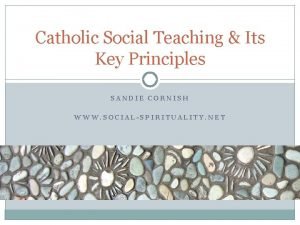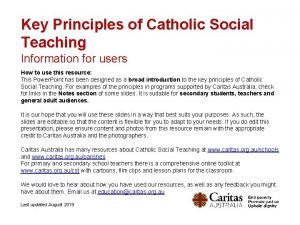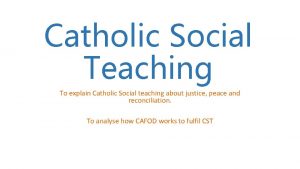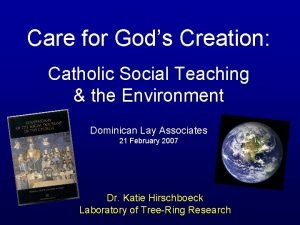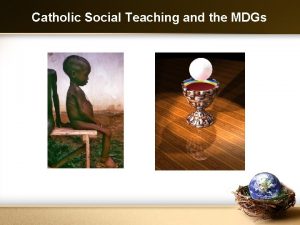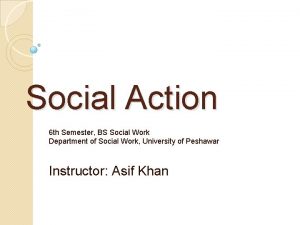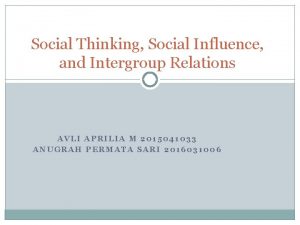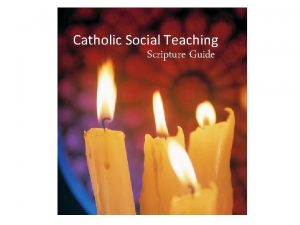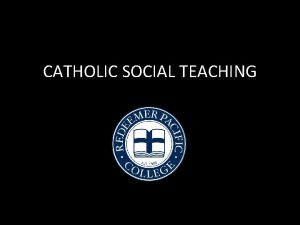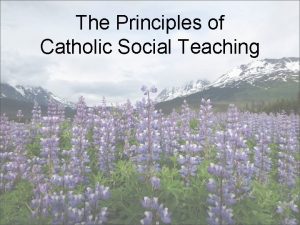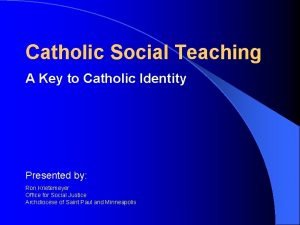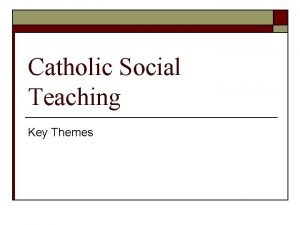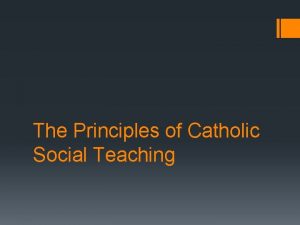Key Principles of Catholic Social Teaching Information for



























- Slides: 27

Key Principles of Catholic Social Teaching Information for users How to use this resource: This Power. Point has been designed as a broad introduction to the key principles of Catholic Social Teaching. For examples of the principles in programs supported by Caritas Australia, check for links in the Notes section of some slides. It is suitable for secondary students, teachers and general adult audiences. It is our hope that you will use these slides in a way that best suits your purposes. As such, the slides are editable so that the content is flexible for you to adapt to your needs. If you do edit this presentation, please ensure content and photos from this resource remain with the appropriate credit to Caritas Australia and the photographers. Caritas Australia has many resources about Catholic Social Teaching at www. caritas. org. au/schools and www. caritas. org. au/parishes For primary and secondary school teachers there is a comprehensive online toolkit at www. caritas. org. au/cst with cartoons, film clips and lesson plans for the classroom. We would love to hear about how you have used our resources, as well as any feedback you might have about them. Email us at education@caritas. org. au Last updated August 2019

CATHOLIC SOCIAL TEACHING AND THE AUSTRALIAN CURRICULUM Caritas Australia works in partnership with communities around the world to end poverty, promote justice and uphold dignity. Our work is guided by the principles of Catholic Social Teaching. These principles can be a powerful tool to help students assess social realities such as poverty, in the light of the Gospel. It supports their ability to think critically and contribute meaningfully as they grow as global citizens. Broadly, Catholic Social Teaching principles can be integrated into inquiry learning across Civics and Citizenship, Economics and Business, Geography and many other curriculum areas. They can also contribute to addressing the Cross Curricular Priorities and General Capabilities. Most Caritas Australia education resources link to the Catholic Social Teaching principles and the Australian Curriculum. For example: Civics and Citizenship Curriculum Key ideas: How societies and economies operate and how they are changing over time. How people exercise their responsibilities, participate in society and make informed decisions? Year 7 Geography Unit 1: Water in the world Unit 2: Place and liveability Year 9: How ideas about and experiences of Australian identity are influenced by global connectedness and mobility. Reflect on their role as a citizen in Australian, regional and global contexts. Year 10: Reflect on their role as a citizen in Australian, regional and global contexts. Year 10 Civics and Citizenship: The Australian Government’s role and responsibilities at a global level, for example provision of foreign aid, peacekeeping, participation in international organisations and the United Nations. For example: Ethical Understanding: exploring the types of participation that Australia has in the Asia region and internationally (for example, exchange programs, peacekeeping, election monitoring, health programs, disaster management). Asia and Australia’s Engagement with Asia: Investigating Australia’s involvement with the United Nations (for example, representation in the organisation and adherence to conventions and declarations that Australia has ratified) exploring the provision of Australian government or non-government aid to a country in the Asia and Pacific region or elsewhere in the world analysing its effects on places in that country. Intercultural Understanding: researching connections between Australia and countries in the Asia and Pacific regions (for example, in terms of migration, trade, tourism, aid, education, defence or cultural influences) and explaining the effects of at least one of these connections on their own place and another place in Australia.

KEY PRINCIPLES OF CATHOLIC SOCIAL TEACHING

BACKGROUND ON CATHOLIC SOCIAL TEACHING Catholic Social Teaching sums up the teachings of the Church on social justice issues. It promotes a vision of a just society that is grounded in the Bible and in the wisdom gathered from experience by the Christian community as it has responded to social justice issues through history. Watch this short animation ‘CST in 3 minutes’, created by several Caritas Internationalis agencies.

BACKGROUND ON CATHOLIC SOCIAL TEACHING The four core principles of Catholic Social Teaching are: • The Dignity of the Human Person • The Common Good • Solidarity • Subsidiarity A Somali refugee child in Kenya, 2011. Photo credit: Laura Sheahen/Catholic Relief Services

BACKGROUND ON CATHOLIC SOCIAL TEACHING Out of the four core principles flow the principles of the Preferential Option for the Poor, Participation, Economic Justice and Care for our Common Home, among others. These principles are responsive to particular social issues such as poverty and inequality, the right to work, and environmental degradation. Growing vegetables in Nepal. Photo credit: Caritas Australia

CARITAS AUSTRALIA AND CATHOLIC SOCIAL TEACHING Our long-term development and emergency aid work is shaped by the tradition of Catholic Social Teaching (CST). CST covers all spheres of life – the economic, political, personal and spiritual. With human dignity at its centre, a holistic approach to development, founded on the principles of CST, is what Pope Paul VI called ‘authentic development’. Mariama and her daughter in Niger, 2015. Photo credit: François Therrien

HUMAN DIGNITY We believe that every person is made in God’s image. We believe that every person has inherent dignity and every life is sacred. The innate dignity of each person is the foundation and inspiration of our vision for a just and compassionate world.

HUMAN DIGNITY We see the image of God in every person, no matter their circumstance. The women, men and children most vulnerable to extreme poverty and injustice should not be hindered from living a life equal to their dignity. South Sudanese girl in Ugandan refugee camp. Refugees have fled conflict and famine in East Africa, 2017. Photo credit: Tommy Trenchard/Caritas

THE COMMON GOOD We believe that humans are not only sacred but social and that we experience the fullness of life in our relationships with others. Working towards the common good requires a commitment from each of us to respect the rights and responsibilities of all people.

THE COMMON GOOD We believe every person is entitled to share in society’s resources. Every person is also responsible for sharing our society’s resources – the common good - with others. This extends beyond our personal interests, and beyond national borders, to our one global human family. Bayan values her education and support she receives while attending classes run by the Caritas Education Program in Jordan. Photo credit: Richard Wainwright

SOLIDARITY Solidarity requires that we see another person as a neighbour, a fellow human who is equal in dignity. Solidarity means recognising the responsibilities we have to each other, and taking an active role in helping others attain their full potential. This is more than just a feeling. It drives us to action.

SOLIDARITY We are called by the principle of solidarity to take the parable of the Good Samaritan (Luke 10: 29 -37) to heart, and to express this understanding in how we live and interact with others, not as a matter of charity, but of justice. Solidarity makes it impossible for us to look away from the injustices that our sisters and brothers experience. Myanmar refugees in Thailand, 2013. Photo credit: Patrick Nicholson/Caritas

SUBSIDIARITY Subsidiarity means that all people have the right to participate in decisions that affect their lives. These decisions should be made at the appropriate level, by the people most affected by the decision.

SUBSIDIARITY It also means that those in positions of authority have the responsibility to listen to everyone’s voice, and make decisions according to the common good. Partnerships and collaboration amongst groups, including all levels of government and social institutions, are necessary to work toward a shared, unified vision for society. Michaela outside the colourful walls of the Purple House where she is a trainee. Photo Credit: Emma Murray

PREFERENTIAL OPTION FOR THE POOR AND VULNERABLE Children, women and men most vulnerable to extreme poverty and injustice are rich in the eyes of Jesus. We are called to be companions to women, men and children who are in vulnerable circumstances. We recognise that extreme poverty is not inherent but constructed in societies and cultures.

PREFERENTIAL OPTION FOR THE POOR AND VULNERABLE We are called to expose the institutions and structures which create and perpetuate inequality and hold them to account. We are called to mobilise our resources, our networks and our prayers in support of the children, women and men who are systematically denied opportunities to exercise and enjoy their rights, freedoms and dignity. SOUTH SUDANESE FATHER AND CHILD IN REFUGEE CAMP IN UGANDA, 2017. PHOTO CREDIT: TOMMY TRENCHARD/CARITAS

PARTICIPATION The principle of participation recognises that everyone has something valuable and unique to contribute. Participation is an innate expression of human dignity. The principle of participation is both a right and a responsibility.

PARTICIPATION Everyone has the right to participate in activities necessary for human fulfilment, such as work, education, and political participation. Participation also implies shared responsibility, where each person, according to their role and ability, participates in society, seeking together the well-being of all. NGUYET’S PASSION AND TALENT IS MAKING PAPER FLOWERS. PHOTO CREDIT: NGUYEN MINH DUC

CARE FOR OUR COMMON HOME As Christians we believe that the whole universe was created by God. We are part of creation, connected to all beings. Furthermore, we have been entrusted by God with the responsibility of caring for His creation.

CARE FOR OUR COMMON HOME We must respect, care for and share all gifts God has given us – including animals, land, the environment, our own personal talents and other resources. We must care for creation responsibly, as true stewards rather than consumers. ALOMA HELPS TO REHABILITATE THE MANGROVES THAT PROTECT THEIR HOUSES AND FAMILIES FROM THE EFFECTS OF NATURAL DISASTERS AND STORM SURGES. PHOTO CREDIT: RICHARD WAINWRIGHT

THE PROMOTION OF PEACE Peace goes beyond the idea of the absence of war or violence. The desire for peace is more than an aspirational goal. Peace is a fruit of justice; and requires a respect for human dignity of all, and a society which is directed towards the common good.

THE PROMOTION OF PEACE Injustices and extreme disparities jeopardise peace. We work together with communities to promote peace through right relationships that embody respect, justice and collaboration. LEBANON, 2012. PHOTO CREDIT: SAM TARLING/CARITAS

ECONOMIC JUSTICE We believe that everyone capable should be involved in economic activity with fair working conditions, and should be able to draw from work the means to provide for themselves and their family.

ECONOMIC JUSTICE Economic activity is not meant solely for profit, but rather in service of the entire human community. Economic justice means not placing money in the centre or prioritising profit and financial wealth over people’s dignity and wellbeing. KUMARI COOKS SWEET SNACKS THAT SHE SELLS FOR 10 RUPEES EACH. NEPAL, 2016. PHOTO CREDIT: CRS/CARITAS NEPAL


Thank you Caritas. AU @caritasaust www. caritas. org. au caritasaustralia
 Key principles of catholic social teaching
Key principles of catholic social teaching Caritas catholic social teaching
Caritas catholic social teaching Seven key themes of catholic social teaching
Seven key themes of catholic social teaching Cafod catholic social teaching
Cafod catholic social teaching It is a key to catholic identity
It is a key to catholic identity Care for god's creation - catholic social teaching
Care for god's creation - catholic social teaching Cst themes
Cst themes Catholic teaching on poverty
Catholic teaching on poverty Principle of dramatization
Principle of dramatization Pre cana worksheets
Pre cana worksheets Christian church hierarchy pyramid
Christian church hierarchy pyramid Catholic church ranking system
Catholic church ranking system Catholic church social pyramid
Catholic church social pyramid Key activities canvas
Key activities canvas Key partners
Key partners Scaled down teaching
Scaled down teaching Social darwinism vs social gospel answer key
Social darwinism vs social gospel answer key Social thinking and social influence in psychology
Social thinking and social influence in psychology Social thinking social influence social relations
Social thinking social influence social relations Formuö
Formuö Typiska novell drag
Typiska novell drag Tack för att ni lyssnade bild
Tack för att ni lyssnade bild Ekologiskt fotavtryck
Ekologiskt fotavtryck Varför kallas perioden 1918-1939 för mellankrigstiden
Varför kallas perioden 1918-1939 för mellankrigstiden En lathund för arbete med kontinuitetshantering
En lathund för arbete med kontinuitetshantering Personalliggare bygg undantag
Personalliggare bygg undantag Personlig tidbok fylla i
Personlig tidbok fylla i Sura för anatom
Sura för anatom
